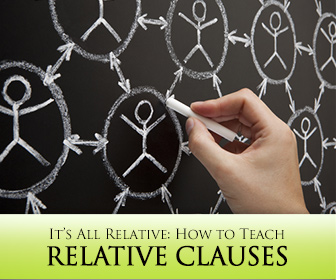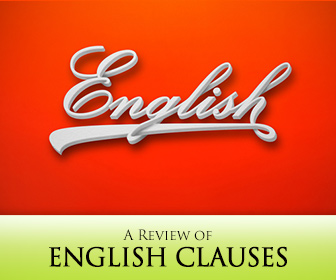Itís All Relative: How to Teach Relative Clauses and Why You Need To


With that said, English contains a myriad of clauses, and sorting them out and keeping them straight can be difficult for ESL students. Once your students have some foundation in English clauses, you both might find a review of English clauses helpful. Here is a list of what they will need to know and you should cover in your review.

Simply put, an independent clause is a sentence. It is a group of words containing a subject and a verb which can stand alone. Dependent clauses, also called subordinate clauses, still contain a subject and a verb, but they do not express a complete thought. That is, they need the association with another clause to be grammatical and logical. Here’s an example. Remember when your elementary school teacher said never start a sentence with because? That’s because this type of clause completes is dependent and must be combined with an independent clause to be grammatical.
It wouldn’t be an English grammar rule if there wasn’t an exception, would it? In this case, imperative sentences are the exception to the subject/verb rule for clauses. Though the underlying grammar follows the subject/verb clause pattern, the surface grammar does not. The reason is that the subject in an imperative sentence is implied – the speaker does not actually articulate the subject when he says the sentence. Still, the speaker and the listener know who the subject of the sentence is. Look at the following example.
This independent clause contains a verb and its object, but it has no articulated subject. English speakers know that the implied subject is “you” in the command.
Some dependent clauses start with a subordinating conjunction. A conjunction combines two clauses, and subordinating conjunctions are used with subordinating or dependent clauses. Some common subordinating conjunctions include the following: if, when, because, although, since, unless, where, after, before and whenever. If a clause begins with a subordinating conjunction, is a dependent clause in a complex sentence. Do not confuse these with coordinating conjunctions (and, but, so) which join two clauses to make a compound sentence.
Other dependent clauses start with a relative pronoun. These familiar words (who, whose, that, which, whom) replace a noun in a clause to create a dependent clause. Relative pronouns always appear at the beginning of the dependent clause.
Relative adverbs are similar to relative pronouns. They are used at the beginning of a dependent clause. They include where, when and why. Rather than replacing a noun in the clause to create a dependent clause, they replace other parts of the sentence.
Zero relatives are another possible start to a dependent clause. In the underlying grammar, they are relative pronouns (that, which, who). These pronouns can be omitted, though, in the surface grammar and are then labeled as zero relatives.
Noun clauses function as a noun in a sentence and are sometimes referred to as nominal clauses. They can fill the role of either subject or object in a sentence. They can begin with any relative pronoun, relative adjective or zero relative.
An adjective clause is a clause that acts as an adjective in a sentence. This type of clause is also known as an adjectival clause or a relative clause. An adjective clause can start with a relative pronoun, a relative adverb or a zero relative. The following examples use a relative pronoun, a relative adverb and a zero relative respectively.
A restrictive noun clause identifies the noun in the sentence. A nonrestrictive noun clause is not necessary to identify a noun in a sentence but instead offers extra information about the noun. Nonrestrictive noun clauses are offset with commas.
Though not considered a clause, an appositive is a reduction of a relative clause. In an appositive, the relative clause is reduced to just the noun phrase in the dependent clause. Appositives can also be restrictive or nonrestrictive
Adverb clauses, also known as adverbial clauses, function as an adverb in a sentence. They may describe a verb, an adjective, another adverb, or they may modify the entire sentence. They are often classified into seven different categories depending on what type of information they convey.
An adverb clause of time indicates when something happened and can start with the following relative adverbs: when, before, after, until, since and as soon as.
Adverb clauses of place indicate a location and can start with the following relative adverbs: where and wherever.
Adverb clauses of cause indicate a reason and can start with the following relative adverbs: because, as, since.
Adverb clauses of purpose also indicate a reason and can start with the following relative adverbs: so that and in order that.
Adverb clauses of result indicate an outcome and can start with the following relative adverbs: so…that and such…that.
Adverb clauses of condition indicate a requiremen and can start with the following relative adverbs: if and unless.
Adverb clauses of concession indicate a contrast and can start with the following relative adverbs: although and even though.
Clauses can be a confusing element of English grammar. However, students whose teachers take time to review English’s many clauses and give them an overall review will find clauses may not be all that confusing after all.